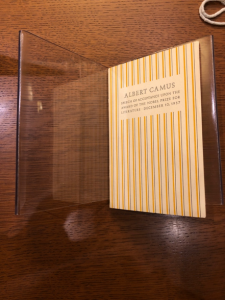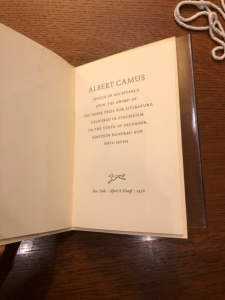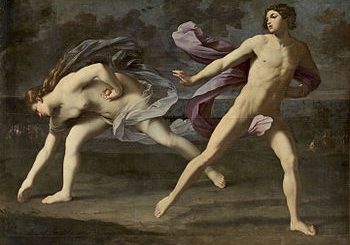Albert Camus’s Noble Prize Speech by Daniela S.
It was my first time in the Rubenstein library, and having the experience of reading Albert Camus’s Nobel Prize speech in this library was very unique. I had previously read many Nobel prize speeches, but usually through online sources; actually having the speech in front of me in the little pamphlet felt very special. I definitely took more time reading it, carefully going over it word by word. It was not something I could just skim or scroll through in my laptop. Nobel speeches aren’t long, but having the artifact in front of me I definitely took more time close reading the words. The pamphlet was small and delicate, it looked old because it was kind of yellow stained.; it was placed in a base to protect the book’s spine; I had to carefully turn each page to make sure not to damage the pamphlet. By carefully turning each page I read every word of the speech not rushing the process which made me engage on a more personal level with the text. It looked old because it was kind of yellow stained.
Camus addresses the role of an artist in the world. Abstract themes such as isolation and silence are only possible among the populated noisy world. A special remark is made to acknowledge all those who, just like him (probably referring to the artistic view of life), share his “same fight” but where not awarded with the prize. Additionally, the speech ties up its ties together with the conceptualization of truth and service of freedom in the world.
The short story of “The Adulterous Woman” is about a couple traveling in Algeria. The main protagonists are Janice and her husband Marcel. While traveling Janine has confounding thoughts about her discontent marriage. One night the couple stay at a hotel and when Marcel falls asleep Janine leaves the room to contemplate the night sky, experiencing a rush of freedom. The story ends with Janine going back to the room and comforting her husband that there is nothing going on.
The short story by Albert Camus “The Adulterous Woman” and the Nobel Price Speech portray very similar themes; more specifically the themes of silence and loneliness. Camus portrays the perspective of an artist in his speech; the image of an artist can be compared to Janine. The character of Janine seems to have a special relationship with silence and loneliness that are highlighted during the night in the hotel where Janine’s thoughts ruminate towards her discontent towards her passionless marriage; afterwards, Janine left the room and went outside to contemplate the stars.
Janine can be perceived as an artist, specially towards the end when she undergoes an aesthetic experience contemplating the stars. At this scene Janine experiences, the silence and solitude she is undergoing and comes to term with these concepts. Even though Janine feels detached from Marcel, regarding her world view, instead of reprimanding him she just dismisses the fact that something is going on with her when she says: “Its nothing dear.” (122). Similarly, the Nobel prize speech extrapolates the idea that nonetheless, artists feel isolated from a world that doesn’t share their views, their role is not to judge that world, rather try to understand it. There is some distance between the relationship of the artist and the world in the same way that there is distance between Janine and her husband. Camus expresses his thought by stating: This is why true artists scorn nothing. They force themselves to understand instead of judging.” The feelings of difference that Camus felt where strengthened by his surroundings but he expresses that a true artist should not judge his incomprehensible surroundings, rather try to understand it.
Even though Camus rejected the term of existentialism, the theme can be captivated in the short story. Janine in some sense is trying to decipher meaning for her own life trying to grasp a sense of belonging and connection with the world. Janine is trying to figure out a meaning for her life, she feels stuck in a monotonous marriage. Her aesthetic experience experiencing a rush of meaning and freedom when she connected herself with the night starry sky gave Janine a sense of belonging; she was able to create a connection and feel connected with something else. Janine had always felt detached from her husband, but by creating a connection with nature, she finds comfort in her life. Just like the prize speech reminds the audience that an artist’s job is not to judge the people who act differently, Janine finds a sense of belonging and after this she tenderly answers back to her husband; she understands that her role in her marriage is not to judge her husband’s way of thinking.
In conclusion, Albert Camus’s Nobel Speech connects with his short story “The Adulterous Woman” through the themes of silence and solitude that are portrayed through the role of an artist in the world.












Recent Comments